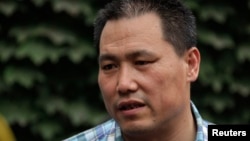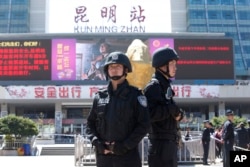Chinese authorities will put prominent human rights lawyer Pu Zhiqiang on trial Monday.
Pu, who has spent more than 1½ years in custody, faces up to eight years in prison for allegedly using social media posts to incite ethnic hatred and create disturbances.
Western governments, including the United States, have been critical of his case and called for his release. Rights groups say Pu’s hearing is nothing but a "political show trial" that raises questions about China’s commitment to the rule of law.
Constitution
The country's constitution actually protects freedom of expression even though authorities routinely censor the media and police the Internet.
One of Pu’s lawyers, Shang Baojun, said they are "cautiously optimistic" and voiced hope that the court could stand up to pressure and make a judgment based on the law.
"Regardless of what the ruling will be, the case has already set a very bad precedent to have charged someone with two serious crimes simply based on 600 words he posted on Weibo," China’s version of Twitter, Shang said.
The attorney noted authorities arrested Pu before they began to look for evidence that might lead to a conviction.
Pu was arrested in May 2014, just before the 25th anniversary of the Tiananmen Square crackdown. But his indictment did not come until one year later.
Outspoken critic
He has long been an outspoken critic of the Communist Party and advocate for rule of law in China. He has represented well-known figures such as artist Ai Weiwei and prominent journalists, as well as lesser-known individuals victimized by the country’s legal system, such as Tang Hui.
Tang was sent to a labor camp for peacefully protesting what she believed was the lenient sentences handed down to individuals who raped and forced her 11-year-old daughter into prostitution.
Pu’s notoriety in China for his legal work has led to a popular following online.
He was a prolific commentator, despite authorities’ efforts to silence him by closing down his accounts. Some of the evidence used in the trial includes criticisms of officials and the Chinese government’s policies in Xinjiang, as well as comments reflecting on the violent attack at Yunnan province’s Kunming train station in March 2014.
Attackers wielding meat cleavers and long knives killed 31 people in the southwestern city, and Chinese authorities blamed Xinjiang separatists.
In one post dated March 2, 2014, Pu wrote: "The Kunming incident was too brutal and the attackers’ sins grievous. If you say Xinjiang is producing terror, now I believe it, but this is effect, not cause. When you sum up such heavy casualties and unbearable consequences in a sentence by saying that those who promote Xinjiang independence are savages and you bear no responsibility, I can’t agree."
'Absurd national policy'
In another posting in May 2014, before his arrest, Pu wrote: "If you say Xinjiang belongs to China, then don’t treat it as a colony, don’t act as conquerors and plunderers, striking out against any and all before and after, turning them into the enemy. This is an absurd national policy."
William Nee, a China researcher for the rights group Amnesty International, says Pu Zhiqiang has been trying to at least ask questions about the war on terror waged in China’s Xinjiang Autonomous Region – and for that he is being persecuted.
"Essentially, what the case comes down to is a few comments that he made on social media that really didn’t endanger security in any meaningful way from the point of view of international law. It’s really as if the system itself is on trial instead of Pu Zhiqiang," Nee said.
Pu’s lawyer Shang Baojun says that, in the end, "Pu’s case will be an indicator of how freedom of speech is respected in China."
Government crackdown
If found guilty, Pu will become the latest in a growing number of individuals targeted since President Xi Jinping took office in March 2013.
Several months ago, authorities launched a massive crackdown on lawyers that has been roundly criticized by rights groups and western governments.
On Thursday, U.S. Ambassador Max Baucus and the German Embassy raised their concerns about Pu’s case in statements released to mark International Human Rights Day. Baucus urged Chinese authorities to release Pu before the trial, arguing that such a gesture would be “a step toward a more just society.”
Human Rights Watch is urging more than 30 ambassadors in Beijing who have previously voiced their concerns about rights issues to show up outside Beijing’s No. 2 Intermediate People’s Court next Monday morning.
"It is unlikely they will be allowed into the courtroom, and it is possible authorities might even try to block access to the building entirely," the statement said. "But at a trial that will be closely watched across the country and the globe, what better way to demonstrate high-level concern and solidarity than by appearing together?"





